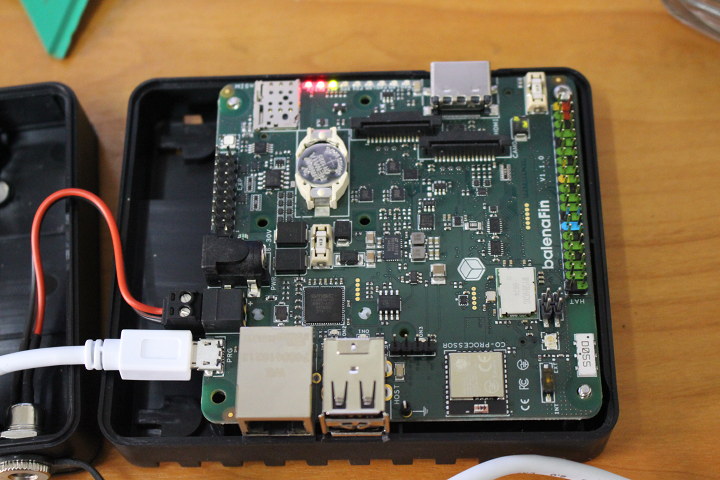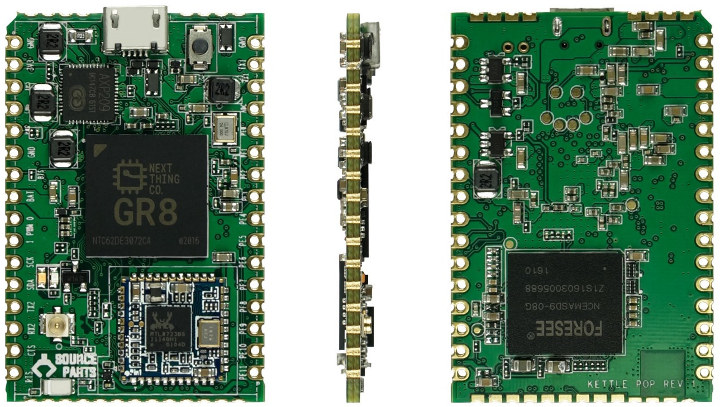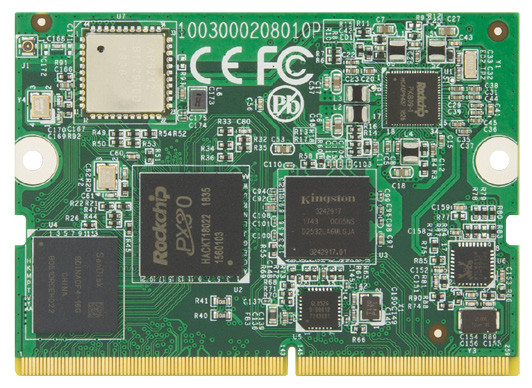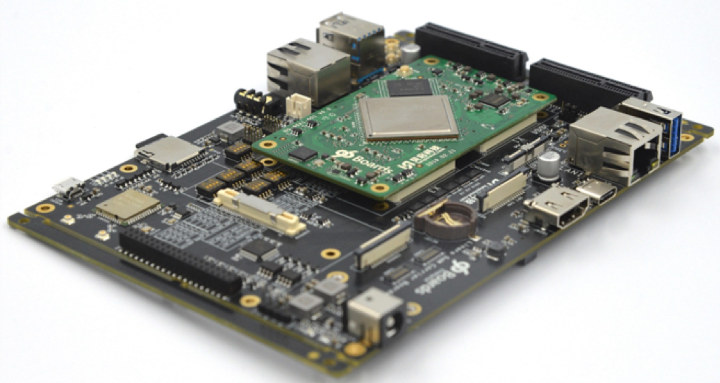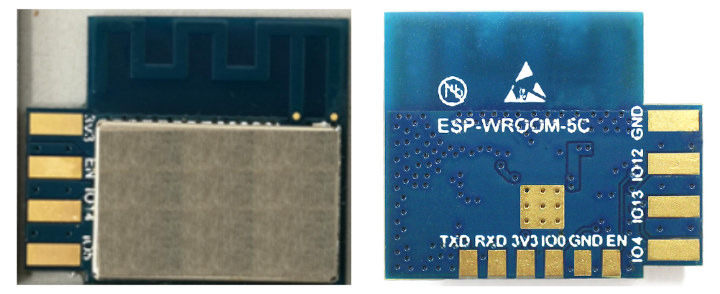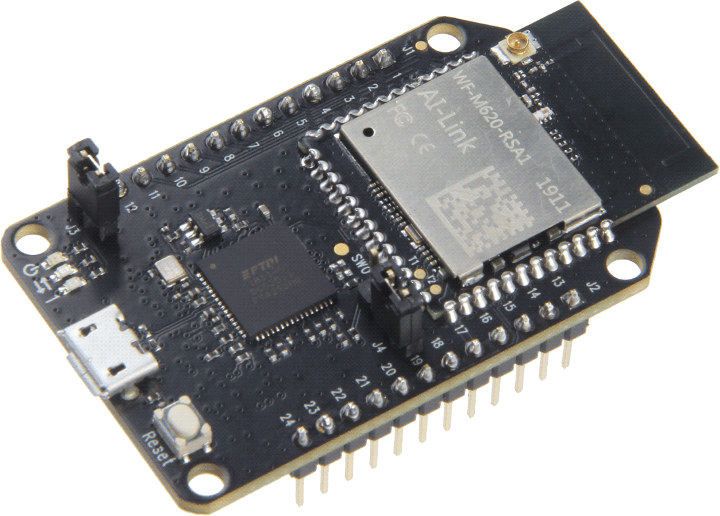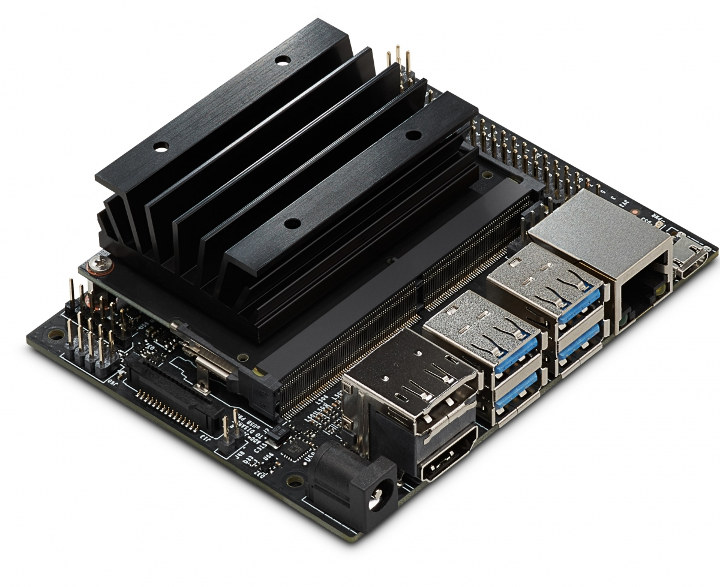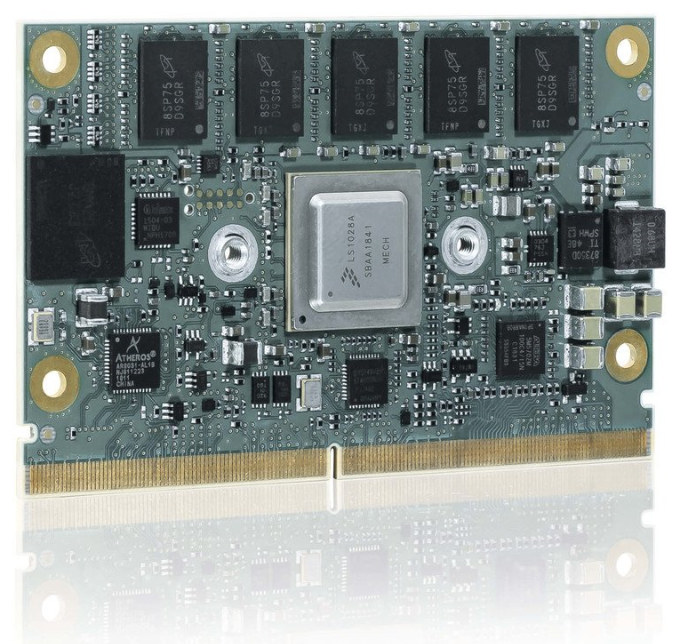balena Fin is a carrier board for Raspberry Pi Compute Module 3/3+ designed specifically for industrial applications leveraging fleet management services provided by Balena. I received balenaFin developer kit last month, and in the first part of the reviewed shows how to assemble the kit. I’m now had time to spend more time with the kit, as well as BalenaOS Linux based operating system optimized for running Docker containers on embedded devices, and balenaCloud services to manage a fleet of devices from a web dashboard. I’ve mostly followed the instructions in the getting started guides here and there, and will document what I had to do to prepare the image, flash it to the board, and load a sample docker application locally, and through balenaCloud. Downloading and Configuring BalenaOS for balena Fin You’ll find BalenaOS in the download page. While we are using hardware based on a Raspberry Pi Compute […]
Kettlepop is a Limited Edition of a CHIP Pro Derivative with 8GB eMMC flash
Next Things Co. CHIP was a $9 Arm Linux board based on Allwinner R8 processor that become fairly popular due to its low price, built-in WiFi & Bluetooth connectivity, open source hardware design, and integration into fun kits such as PocketCHIP portable gaming console/ Linux handheld computer. Later the company expanded their product line with CHIP Pro featuring Allwinner GR8 system-in-package, and designed as a low profile system-on-module to make it more suitable for integration into commercial products. Sadly, the company eventually ran into financial problems, and had to fold later in 2018. However, later that year, a company called Source Parts announced they were working on Popcorn Computer, a derivative of C.H.I.P. board, and appears to have sold it through Amazon US for a time. But this morning, I was informed that a board called Kettlepop was added to HackerBoards database with Next Things Co. GR8 SiP, and also […]
ARBOR Introduces SOM-RP301 Rockchip PX30 SoM for Retail Kiosks
Rockchip PX30 is a quad core Cortex-A35 processor with a dual VOP (Video Output Processor) in order to drive two independent displays, that has low power consumption, low thermal requirements, and that we previously found in some car infotainment systems. But the processor is also suitable for other applications, and ARBOR Technology recently launched SOM-RP301 system-on-module based on the PX30 processor, and specifically designed for fanless retail kiosks such as electronic restaurant menus, automated currency exchange machines, ticketing kiosks and more. SOM-RP301 system-on-module specifications: SoC – Rockchip PX30 quad core Cortex-A35 processor @ 1.5 GHz with Arm Mali-G31 MP2 GPU System Memory – 1GB LPDDR3 (Up to 4GB as option) Storage – 16 GB eMMC flash Connectivity – Fast Ethernet transceiver, 802.11 b/g/n/ac WiFi 5 + Bluetooth 4.0 module Edge Connector – SO-DIMM connector with Display – LVDS or MIPI DSI Camera – MIPI CSI RX interface with 8MP ISP […]
TB-96AI & TB-96AIoT are the First 96Boards Systems-on-Module
First introduced in 2015, 96boards specifications define mechanical, electrical, and software specifications for single board computers, but in 2017 Linaro asked companies to provide some feedback on what they’d like for a 96boards system-on-module standard. And for the first day of Linaro Connect Bangkok 2019, the 96Boards SoM specifications have now been announced, together with the introduction of Rockchip RK3399Pro powered TB-96AI and Rockchip RK1808 based TB-96AIoT, the first compliant 96Boards SoMs, and corresponding 96Boards SoM Carrier Board. 96Boards System-on-Module Specifications Two 96Boards SoM specifications have been unveiled with the Compute Module Specification and the Wireless Specification. The 96boards Compute Module Specification defines a SoM with up to four 100-pin connectors, but only one is mandatory (X1), and two form factors are specified: SOM-CA (85 x 50 mm) and SOM-CB (50 x 50 mm). List of signals associated to each connectors: X1 – SoM managements, 1x UART, 2x I2C, 1x […]
ESP-WROOM-5C is a Side-Mounted ESP8285 WiFi Module
You’d think by now we’d have enough ESP8266 or ESP8285 WiFi modules, but based on an FCC listing, we now know that Espressif Systems has been working on another ESP8285 WiFi module – ESP-WROOM-5C – designed to be side-mounted. ESP-WROOM-5C specifications: SoC – Espressif Systems ESP8285 Wi-Fi 802.11 b/g/n WiFi 4 @ 2412 MHz ~2462 MHz; Station/SoftAP/SoftAP + Station modes WPA/WPA2 security with EP/TKIP/AES encryption PCB antenna Peripheral interface I2C/IR Remote Control GPIO/PWM Operating voltage – 2.7V ~ 3.6V Operating current – Average: 80 mA Minimum current delivered by power supply – 500 mA Dimensions – 19 x 16 x 3.2 mm Temperature Range – -40°C ~ 105°C Reliability Tests – HTOL/HTSL/uHAST/TCT/ESD The module supports firmware upgrade over UART or OTA (Over-The-Air). Software development can be done with the IDF SDK for custom firmware, but “Cloud Server development” is also possible, and an Android/iOS app can be provided for user […]
MT3620 Mini Dev Board is a Cheaper Microsoft Azure Sphere Board
Announced nearly one year ago, Microsoft Azure Sphere is an ecosystem comprised of Azure MCUs with Microsoft Pluton Security System, Linux based Azure Sphere OS, and a secure cloud service called Azure Sphere Security Service. The first official Azure development board – MT3620 Development Board for Azure Sphere – was launched last year for $84.95. The kit may not have attracted a large number of developers, so there’s now a cheaper version – MT3620 Mini Dev board – going for $34.90 on Seeed Studio. Note that’s a pre-order and shipping is scheduled for May 13, 2019. MT3620 Mini dev board specifications: CPU Module – AI-Link WF-M620-RSA1 module with Mediatek MT3620AN single core Arm Cortex-A7 processor @ 500 MHz with 4MB SRAM, dual core Arm Cortex-M4F real-time core @ 200 MHz with 64KB RAM, Pluton security sub-system, and WiFi. Storage – 2x 8MB dual channel quad SPI (TBC) Connectivity – Dual band […]
NVIDIA Introduces $99 Jetson Nano Developer Kit
NVIDIA Tegra X1 octa-core Arm processor with a 256-core Maxwell GPU was introduced in 2015. The processor powers the popular NVIDIA Shield Android TV box, and is found in Jetson TX1 development board which still costs $500 and is approaching end-of-life. The company has now introduced a much cheaper board with Jetson Nano Developer Kit offered for just $99. It’s not exactly powered by Tegra X1 however, but instead what appears to be a cost-down version of the processor with four Arm Cortex-A57 cores clocked at 1.43 GHz and a 128-core Maxwell GPU. Jetson Nano developer kit specifications: Jetson Nano CPU Module 128-core Maxwell GPU Quad-core Arm A57 processor @ 1.43 GHz System Memory – 4GB 64-bit LPDDR4 @ 25.6 GB/s Storage – microSD card slot (devkit) or 16GB eMMC flash (production) Video Encode – 4K @ 30 | 4x 1080p @ 30 | 9x 720p @ 30 (H.264/H.265) Video […]
Kontron SMARC-sAL28 System-on-Module Supports ECC Memory, Up to 5 TSN Ethernet Ports
Many systems-on-module are equipped with one Gigabit Ethernet transceiver / PHY, but NXP LS1028A powered Kontron SMARC-sAL28 SoM is equipped with two Gigabit Ethernet PHY, and can optionally support up to 5 TSN-capable Gigabit Ethernet ports directly from the controller thanks one PCIe line that can be used as a QSGMII (Quad Serial Gigabit Media Independent Interface) port. Furthermore, the module comes with up to 4GB non-ECC or ECC memory. “What is TSN?” you may ask. It stands for “Time-Sensitive Networking“, provides distributed time synchronization and deterministic communication using standard Ethernet networks for applications such as distributed synchronized measurements, coordinated distributed data logging, next-generation computer numeric control machining, automotive networks, and more as explained on National Instruments website. But let’s go back to Kontron SMARC-sAL28 system-on-module with the hardware specifications: SoC – NXP LS1028A dual Arm Cortex A72 processor, 3D GPU System Memory – Up to 4GB DDR3L ECC or […]


